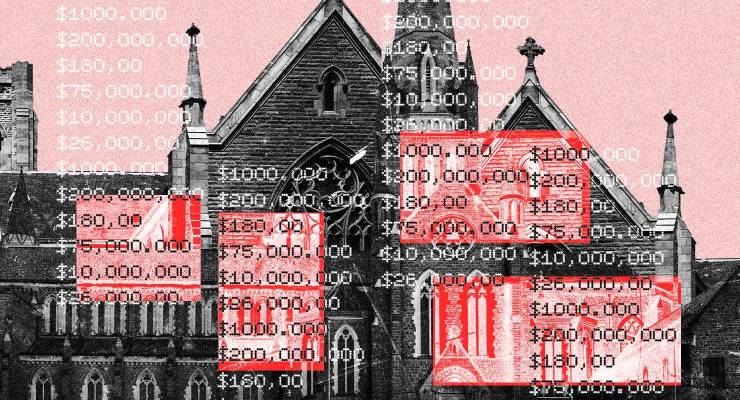
The government is facing renewed calls to remove the financial reporting exemptions given to thousands of religious charities after a new Productivity Commission (PC) report recommended doing so “to enhance public transparency and accountability”.
The proposal to scrap “basic religious charities” (BRCs), which control more than $6 billion in assets, has been welcomed by the Greens, secular organisations and former Jehovah’s Witnesses who are sexual abuse survivors.
The review, which was released on November 30 and is part of an inquiry into charitable giving in Australia, calls for the removal of BRCs so that these charities are subject to the same Australian Charities and Not-for-profits Commission Act (ACNC) governance and reporting requirements as others.
In line with the requirements for other charities, reporting should be proportionate to its size and based on revenue, it said. It said that most BRCs are small and like their counterparts would need to give the ACNC basic yearly financial information, sans an independent audit or review. If BRCs breached government standards, the ACNC would be able to act.
“The Productivity Commission says what Labor and Coalition governments have tried to hide for years: that the BRC laws allow institutions like Hillsong and the Catholic Church to hide from scrutiny,” Greens Senator and justice spokesperson David Shoebridge told Crikey.
“It’s always been obvious that reporting requirements should be based not on the religious affiliation of an entity, but on the size of that entity. Victims of child sexual abuse have been deeply frustrated with laws that allow organisations to avoid even the most basic financial and organisational reporting.”
No arguments put forward by Catholic and Anglican churches five years ago to justify the creation of BRCs hold water, Dr Phil Saj, a visiting scholar at the University of Adelaide’s business school who earlier this year conducted new research into BRCs, told Crikey in August. The legislation to allow for them under the ACNC Act was introduced “with hardly almost zero public debate” during the “heady days” of the Rudd and Gillard minority government in 2012, Saj said.
There was a review five years later, said the academic. It revealed that most BRCs have financial reporting requirements in place through denominational frameworks, and the requirements imposed through those are “far more onerous” than those required under the ACNC ACT.
For more than a decade, BRC status has been used by some institutions to hide their assets and disenfranchise their members, with no public oversight of the finances or decision-making of institutions, Shoebridge said.
“It was always unfair to other small charities that religious institutions got a free pass regardless of their size because of some dodgy deal in 2012,” he said. “Regulation of the charity sector by the government should seek to enhance trust and public outcomes, not be designed to curry favour with churches.”
Lara Kaput and Steven Unthank, both survivors of institutional child sexual abuse within the Jehovah’s Witnesses, co-founded SaySorry to hold the religious organisation to account. They said that a number of the draft report recommendations, put forward primarily on the hundreds of Jehovah’s Witness charities, matched those made in their submission. They highlighted the potential harms that some BRCs can inflict upon the community and called for tighter regulatory control and more disclosure on charity financing so that the public is informed on what their donations to BRCs are actually for.
The PC’s recommendations include a proposal that charities with only the category of “advancing religion” would be ineligible for “deductible gift recipient” (DGR) status.
This system was “poorly designed, overly complex and excludes many causes without a coherent policy rationale”, PC associate commissioner Krystian Seibert said in a media statement that accompanied the report’s release.
However, it remains to be seen whether this proposal around DGR status will actually be implemented, Kaput told Crikey. The recommendations are a start but don’t go far enough, she said.
“I have a sinking feeling that the Jehovah’s Witnesses will try anything to get around the suggested changes,” Kaput said. “It may be controversial, but it seems that both the Liberal and Labor governments are striving to protect religion. Secularist Max Wallace called Australia a ‘soft theocracy’. Whenever I hear about the cost of living being Labor’s highest priority and, knowing that so many Australians are no longer religious, I wonder, why are religions being given any tax benefits at all? Tax the churches!”
President of the Rationalist Society of Australia Meredith Doig welcomed the PC’s recommendations.
“On numerous issues, the Labor Party shows itself to be beholden to religious interests,” she told Crikey.
“The Australian community will now be watching closely to see if the Albanese government and the assistant minister responsible for the charities sector, Andrew Leigh, listen to the views of the Productivity Commission or instead listen to the views of special religious interests. If the government is concerned about transparency, accountability and trust in the charities system, it should act on this recommendation of the Productivity Commission.”
Leigh told Crikey that as part of a Labor election commitment to put the country on a path to doubling giving, the government had asked the commission how to make it easier for Australians to donate with confidence and trust to the causes that they support.
“The interim report reflects a wide-ranging and comprehensive review of the role that giving plays in supporting and shaping Australian communities,” he said.
“Religious organisations are anchors in our communities, we’ll listen closely to their reactions to the Productivity Commission’s report, and we encourage all stakeholders to continue to engage as the commission continues consultations to finalise the report.”
The commission is seeking feedback on the report and encourages anyone with an interest to make a submission by February 9, 2024, an ACNC spokesperson told Crikey. “As the regulator, the ACNC administers laws and regulations,” they said. “Any change to law or policy impacting charities is a matter for government.”
There were 8,280 BRCs — 17% of all registered charities — according to an ACNC analysis of the annual information statements of 49,402 charities from 2021, as highlighted in the latest Australian Charities report released in June, the spokesperson said.
The report also recommends that the ACNC’s regulatory and information-sharing role be bolstered by state and territory regulators working together more and that the government set up an Aboriginal and Torres Strait Islander philanthropic foundation.








An important report! The separation of church and state, a vital plank of our democratic system, is compromised by this discriminatory practice. The last census showed that 39% of Australians are non-religious but still their tax payer dollars are used to fund religious “chaplains” in schools and give deferential funding to so-called “faith-based” schools. Minister Leigh says the churches are anchors in their communities, but they can be more like a drag. We need a more thorough going study of the interface between religions and the state in Australia.